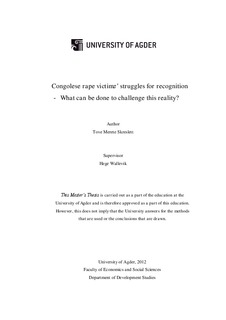| dc.description.abstract | With up to 400 000 women being raped annually it is clear that this is a challenging and complex problem in DR Congo. Many actors treat and support rape victims, playing an essential role in a country where health facilities are few - and a welfare system is an unknown concept. However, where the initial stage after a rape may be the most critical phase, it is important to look into how rape victims cope more long-term - after medical treatment and psychotherapy. This study has therefore interviewed female rape victims in order to get a broader understanding of their situation, after being subjected to rape(s).
Based on the stories from the Congolese women in this study it appears that the treatment and support they have received is of inevitable importance. However, being a rape victim in the DRC also represents other challenges that exceed physical and psychosocial problems. According to the female informants there are cultural structures that shapes how their lives turn out after being raped. Culture and traditions largely influences how a rape victim is perceived by the wider society, and affects rape victims socioeconomic possibilities. The general population perceive rape as an evil act. Still reactions towards rape victim are often ruthless. The culture limits both the choices of the rape victim and family-members, by shaping the way in which people are expected to manage the situation. The result from this study demonstrates that this repeatedly causes families disintegrate due to the shame and humiliation connected to a woman being raped.
There are a range of secondary effects of rape, which negatively affects both rape victims themselves, their close family, as well as the society at large. There seems to be a general wish to change this destructive reality in the DRC where the consequences of rape may be experienced as even worse than the rape itself. Simultaneously, it is important to note that the people rejecting a raped woman may not see the discriminative reaction as a valuable and desired principle. On the contrary, these reactions and responses are indirectly moulded by the Congolese culture and traditions, and limit peoples‟ opportunities to act another way than what is culturally understood as correct. There is obviously a need to combat the presence of sexual violence (SV) in DRC. However, in addition to preventive measures, it is imperative to conduct awareness-raising work, where gender disparities and detrimental traditions are challenged. According to the accounts given by the female rape victims, this would most likely improve their livelihood after being subjected to rape. | no_NO |
